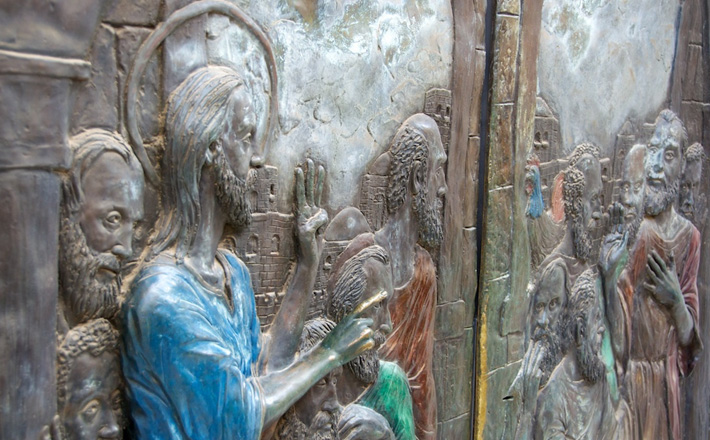Commentary on Isaiah 50:4-9a
In recent decades, the business world has begun to use the phrase “servant leadership” to designate one who leads by serving and empowering others, not by accumulating and hoarding power.
Furthermore, some Christians have adopted the phrase within the context of the church and associated this type of leadership most closely with Jesus.
Jesus becomes the model of servant leadership. Indeed, there are many examples of Jesus’ leadership in the Gospels that are worthy of examination and imitation. In fact, during this upcoming Week called Holy Jesus will perform a servant’s act by washing the feet of his disciples.
However, as we begin the last week of Jesus’ life on this Palm/Passion Sunday, our attention turns to another servant found in the book of Isaiah. By selecting this reading from Isaiah for this particular Sunday in the liturgical year, the compilers of the Revised Common Lectionary compel us to compare (and contrast) Jesus’ own final week with the life of an earlier, prophetic servant.
This servant does not have a name.
In fact, the identity of this servant is greatly debated within Christianity and between Christianity and Judaism. Is it an individual leader such as a prophet? Or does the servant represent the whole community of Israel?
The speaker of Isaiah 50:4-9a, this first-person speech, is likely the servant of Second Isaiah (Isaiah 40-55), although the term “servant” is not explicitly named in the passage (although see the following verses, 50:10-11). This servant has received much recent, scholarly attention ever since scholars isolated four poems within this book section that relate to the Servant: Isaiah 42:1-4, 49:1-6, 50:4-9, 52:13-53:12.
Many of these passages are familiar to us because of their frequent recitation in churches as well as their use in Handel’s Messiah. The last poem, Isaiah 52:13-53:12, concerns a suffering servant, which early Christians read in light of Jesus.
Attempts to identify specifically the ancient servant during the exilic time period have resulted in speculation about individuals as well as the community. The debate will continue given that one of the poems names Israel explicitly as the servant (49:3), while other poems have a more individualistic tone.
Furthermore, this servant of Second Isaiah seems to have a mission, a purpose within the exiled Israelite community. While it is clear at some points that the servant is to be identified as Israel, it is equally clear in other poems that this servant is to help Israel.
No matter the identity of the servant in the past, we can still learn from his monologue today.
In order to break the passage into appropriate sections, I use the occurrence of the double divine name — Lord God (NRSV). This name is mentioned four times in the passage alongside a verb and the pronoun “me,” creating a nice structure.
verse 4: The Lord GOD gave me a tongue
verses 5-6: The Lord GOD opened to me ears
verses 7-8: But the Lord GOD helps me
verse 9: The Lord GOD helps me
The first two verbs are in the past, while two are in the present. Therefore, the speaker in verses 3-6 speaks of the past actions of God, while verses 7-9 call to mind present divine actions.
The first action recalls the duties and actions of a teacher. First, the servant figure is given the tongue of a teacher, or more literally, the tongue of one who has been taught. The literal translation places more emphasis on the fact that all teachers were first taught themselves; they sat under good teaching in order to become teachers. The receipt of the tongue is for a particular purpose: to speak an encouraging word to the weary. This servant-teacher is called to hearten the disheartened.
The second action moves to another important body part, the ear. God has opened the ears of the servant so that the servant might hear God’s voice. God’s rouses the servant every morning and calls the servant to listen. Then, the servant catalogs plainly the abuse and insults he has received. The link between the openness to hearing God’s voice and the abuse inflicted on the servant is not completely clear. Perhaps the teachings from God were not what the people wanted to hear?
The third and fourth actions occur in the present and represent statements of confidence in God. The servant proclaims that he has no reason to be humiliated — despite the abuse — because God comes to his aid. The mission of the servant has not wavered in light of the public’s negative and violent reaction. The servant appears certain about God’s calling in the previous verses; therefore he feels that vindication by God will come.
In light of the support from God, the servant interweaves three rhetorical questions into his statements of assurance:
Who will contend with me?
Who are my adversaries?
Who will declare me guilty?
The servant taunts these contenders by asking them to confront the servant. Then, the passage ends with the sobering note that these adversaries will wear out like a moth-eaten garment. They will ultimately disappear as they have no clear case against the servant, and the servant has God as his legal counsel and ultimate vindicator.
The servant’s confidence springs from past actions of God in calling the servant and bestowing gifts up him as well as God’s present helping actions in the face of confrontation by enemies. Paul, a Jew living in a time after the Babylonian exile but one steeped in the Hebrew Scriptures including Isaiah, will express this confidence by asking, “If God is for us, who can be against us?”


April 13, 2014